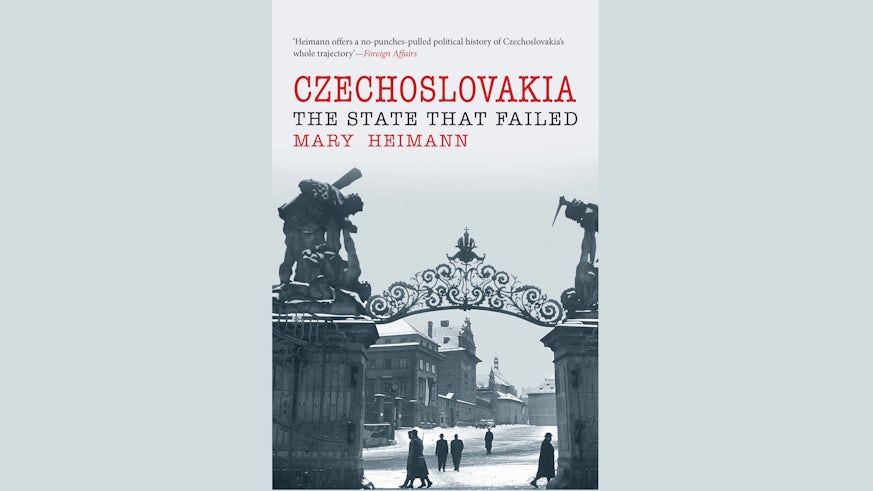Czechoslovakia: The State That Failed
16 December 2016

How historical research led to involvement in international policy recommendations
The ground-breaking research of a Cardiff professor is showcasing how historical research can impact the wider world and shape international policy.
Since its publication in 2009, Mary Heimann’s book Czechoslovakia: The State That Failed has become the authority on the history of the state that emerged from the First World War. Within a year of publication it was noted by the Czech Academy of Science in its report of the most significant books to be published in the Humanities for 25 years. It remains one of only five AHRC Research Impact case studies in Wales.
The no-punches-pulled political history tells the story of the country from its founding in 1918 to partition in 1992 – tracing its full-circle history from fledgling democracy through Nazi occupation, Communist rule and invasion by the Soviet Union to democracy again.
The book dispels common Western myths about the state, revealing how intolerant nationalism and an unhelpful sense of victimhood led Czech and Slovak authorities to discriminate against minorities and to compete with the Nazis to persecute Jews and Gypsies, unknowingly paving the way for the Communist police state. According to Heimann, this made Czechoslovakia less of a regional exception than is commonly supposed, and reinforces the lesson that no state, even a democracy, is immune from the temptations of state-sponsored discrimination towards its own minorities.
Through painstaking research conducted over two years in Prague, the dual-national has exposed how Czechoslovakia’s reputation for liberal, democratic values and the decent treatment of its German, Slovak, Hungarian, Polish, Yiddish, Romany and Rusyn-speaking minorities was at odds with reality. In fact the state consistently pursued Czech and Bohemian-centred policies, excluding and alienating the other nationalities and regions in the state.
The bitter truth was that Jews and Gypsies (Roma), initially persecuted by the Czechoslovak authorities before the Second World War, were virtually eliminated by its end. Exposed too is the post-war ‘cleansing’ of German and Hungarian speakers and gift to the Soviet Union of Subcarpathian Ruthenia.
Examining Czechoslovakia’s ’s recurrent Slovak-Czech tensions and bringing to light the state’s persistent Czech-centredness, the book not only sparked widespread public and private discussion about Czechoslovakia’s past but has launched a new debate, still reverberating today.
Since its publication, Professor Heimann has been invited to speak at a host of international events alongside guests such as former US Secretary of State Madeleine Albright.
To date most significant international impacts are invitations to address the Czech Senate and to participate in the NATO Partnership for Peace (PfP).
Addressing Professor Heimann about the creation of Czechoslovakia in the televised panel in 2013, former Prime Minister Petr recognised the significance of her research. “Your book has helped by sparking our conscience. We can’t go back and rectify things, but we can make our understanding more precise. We will always need to grapple with national myths and superstitions" he said. "I believe that your book will contribute to a certain cleansing of the atmosphere in this country. But it is going to be painful.”
In a potentially more significantly step, Professor Heimann presented her insights into the peaceful division of Czechoslovakia into separate Czech and Slovak republics at the NATO Partnership for Peace (PfP) workshop, held in Kiev in 2015.
“It’s extremely empowering to witness historical research having such an impact” she added. “If the lessons of history can help regions such as the South Caucasus to avoid the pitfalls experienced elsewhere, it can only be to the good.”
Within a novel framework of historical comparison and simulated negotiations, the study is contributing to efforts to resolve the current conflict in the South Caucasus through new PfP policy recommendations. As such, the benefits of her investigation are likely to be felt for some time yet, both in the troubled region bordering Eastern Europe and Southwest Asia, and elsewhere in the world.
Reviewed in Foreign Affairs, The Economist, Tribune, the US Foreign Service Journal and across Eastern and Central Europe, Czechoslovakia: The State That Failed is now in its third edition with Yale University Press. It continues to attract widespread, international interest, including from diplomats and policy-makers.
Currently researching her next book Christianity behind the Iron Curtain, again for Yale University Press, Professor Mary Heimann teaches Czechoslovak history, together with some Polish and Hungarian history. The US/British academic moved to Cardiff from Glasgow this summer.

